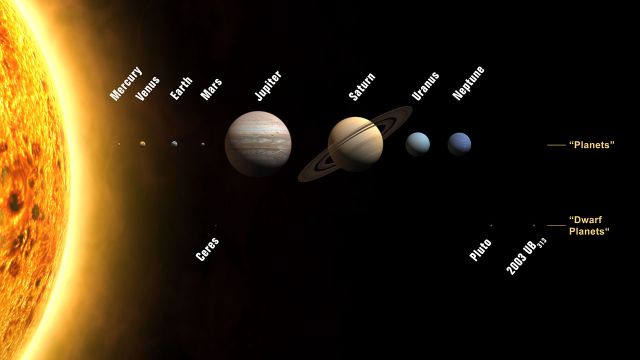
|
TuTh 14:00-15:50 125 McKenzie Hall |

|
TuTh 14:00-15:50 125 McKenzie Hall |
JHU New Horizons (Pluto and MU 69)
Astronomy 121 is an introduction to the Solar System for non-science majors.
The past
25 years has seen an explosion in our understanding of the contents,
formation and evolution of the solar system, mainly due to numerous nasa
missions/probes to eight of the nine planets. the study of the
characteristics of other planets and planetary systems
has provided tremendous insight into our
understanding of how our own planet, the Earth, operates and changes under
mankind's influence. The overarching purpose of the course is
the education of students on the notions of science (science literacy)
and the motivations and methods underlying our exploration of the Solar
System also spending some time on
issues concerning our environment and our place in the Galaxy.
The specific goals of this class are 1) to gain an understanding of basic
science that underlies astronomy (the forum is the exploration of our
solar system), 2) to explore the properties of the objects that make up our
solar system, and 3) to achieve an understanding of how the evolution of
other planets has an impact on how we make choices to manage our own
environment. in addition, this course traces the history of our developing
knowledge of the solar system in order to explore how the scientific method
works and how civilization has gained from the progress of science and
technology. the interplay between technology (telescopes, robotic space
probes) and knowledge gained about the solar system is a key theme to the
course.
Instructor: James N. Imamura
Homeworks
Cassini (Saturn)
Juno (Jupiter)
Curiosity Rover (Mars)
Europa Clipper (Jupiter)
LIGO (gravitational waves)
star date,
Astronomy,
sky and telescope news,
national geographic,
apod
Office: 457 Willamette Hall
e-mail: imamura@uoregon.edu
Phone: 541-346-5212
Office Hours: by appointment
Course: Astr 121, the Solar System,
is a science group satisfying course (<3)
Course CRN:
Text: Essential Cosmic Perspective, 8th edition,
Bennett, Donahue, Schneider & Voit
Grading:
2 equally weighted exams, 60 points per exam
+ 4 homework/in-class exercises, 10 points per exercise
+ final exam, xx points ===>
total points
Test Schedule:
Date |
|
|
|
6/25 | Introduction
Chapter 1Topic 1 | ||
6/25-6/27 | Naked Eye Astronomy
Chapter 2Topic 2 | ||
6/28 | The Development of Modern Astronomy
Chapter 3, Chapter 4.2-4.4Topic 3 | ||
7/2 | The Solar System
Chapter 6Topic 4 | ||
7/2-7/3 | Formation of the Solar System
Chapter 6Topic 4a | ||
7/3,7/5 | Is the Solar
System Unique?
Chapter 10Topic 4b | ||
7/9 | The Terrestrial Planets
Chapter 7Topic 5 | ||
7/10 | The Interiors and Surfaces of the Terrestrial Planets
Chapter 7Topic 5a, Topic 5b | ||
7/11 | Atmospheres of the Terrestrial
Planets
Chapter 7Topic 5c | ||
7/12 | The Jovian Planets
Chapter 8Topic 6 | ||
7/16-7/17 | Jupiter and Saturn
Chapter 8Topic 6a | ||
... | Uranus and Neptune
Chapter 8Topic 6b | ||
7/18 | Dwarf Planets, Asteroids, and Comets |
Chapter 9 | Topic 7 |
... | Search for Life in the Solar System
Chapter 19Topic 8 | ||